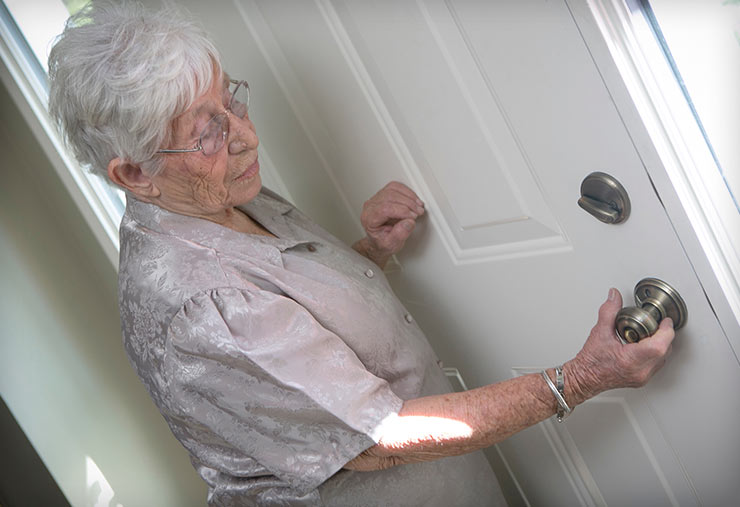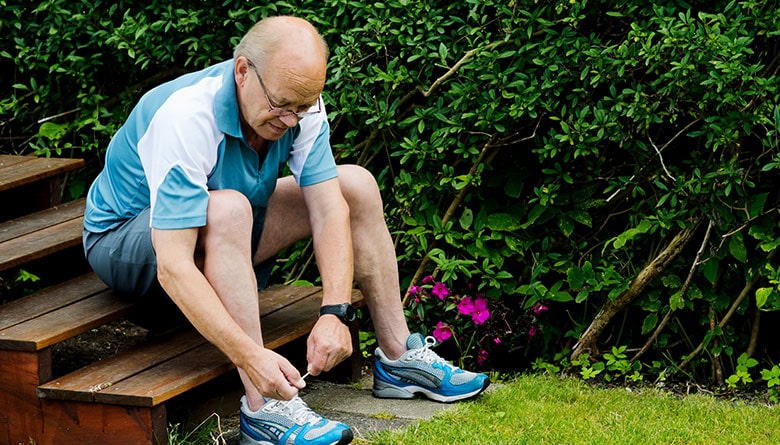
Understanding the primary causes and the various triggers of wandering in Alzheimer’s is the first step in overcoming the problem. Each trigger has its own range of solutions for preventing wandering.
Despite all your efforts to stop the wandering, your loved one may still do so.
Even the most dedicated caregiver cannot watch the other person every second of every day. A smarter and less stressful way is to work on ways to ensure their safety even if they do wander.
The main concern is to address the safety issues involved when they do wander. Wandering by itself is not particularly dangerous, especially if it is happening within a secure and organized setting.
Follow these tips to try creating such an environment.
Organizing a Secure Home

- To prevent them from leaving the house, especially at night, bolt the door with the locks out of the line of sight.
- You can consider fixing slide bolts that can be fixed at the top or bottom of the door.
- The doors and windows can be camouflaged by giving them the same color as the walls or you can consider hiding them behind curtains. Fix childproof knobs or use knobs that are the same color as the door.

- You can use devices that get triggered if a door is opened. These range from sophisticated electronic home alarms to simple bells positioned over the door.
- Try putting up signs for doors like the ones leading to the bathrooms and bedrooms.
- You can also put up ‘Stop” or ‘Do Not Enter” signs on the door leading out of the house. This does sometimes prove helpful in preventing them from wandering out.

- For night wanderers, you should restrict fluids a couple of hours prior to bedtime.
- Make it a point to remind them to use the bathroom just before going to bed.
- It is a good idea to provide night lights in their bedroom and in front of the bathroom in case they venture out on a nightly jaunt.
- Keep some fruits, crackers, and a glass of water next to their beds if being thirsty or hungry in the middle of the night seems to trigger the wandering.

- Remove or reduce potential hazards like extension cords and throw rugs that can cause them to fall and injure themselves in their wandering.
- Install gates at stairwells to prevent accidental falls.
Creating a More Secure Community

- Introduce your wanderer to your neighbors so that they can recognize him by face. The natural inclination for most people is to avoid getting involved.
- So be clear in your request that you must be alerted if they happen to see him in the neighborhood on his own.
- People with Alzheimer’s should never be left alone at home or even in the car if they stop for quick shopping.
- Keep temptations like car keys out of their sight. You never know when they may just drive off and leave you in panic concerning the dangers to themselves or others.
- If you plan to take them to a crowded environment ensure they are dressed in bright and easy-to-spot clothing. Ensure they have an ID on their person.
- Register your loved one with local organizations, if any, that deal with such cases. Such organizations work in tandem with local law enforcement to quickly search and pinpoint the wanderer.
Wandering Protection Devices

There is a wide range of technologies that can help caregivers keep wandering loved ones safe.
You can buy wandering-protection systems that use the latest technologies; Internet, smartphones, wireless Internet, and crowdsourcing power to grow a community formed of families, friends, and community members that create a robust safety solution.
Most wanderers can be found within a few miles of their houses. Tracking devices help to reduce the search time from days or hours to just minutes.
This timely response is what helps to reduce potential injuries or even save the lives of those who wander due to their medical conditions like autism, Alzheimer’s, or other kinds of health disorders.
